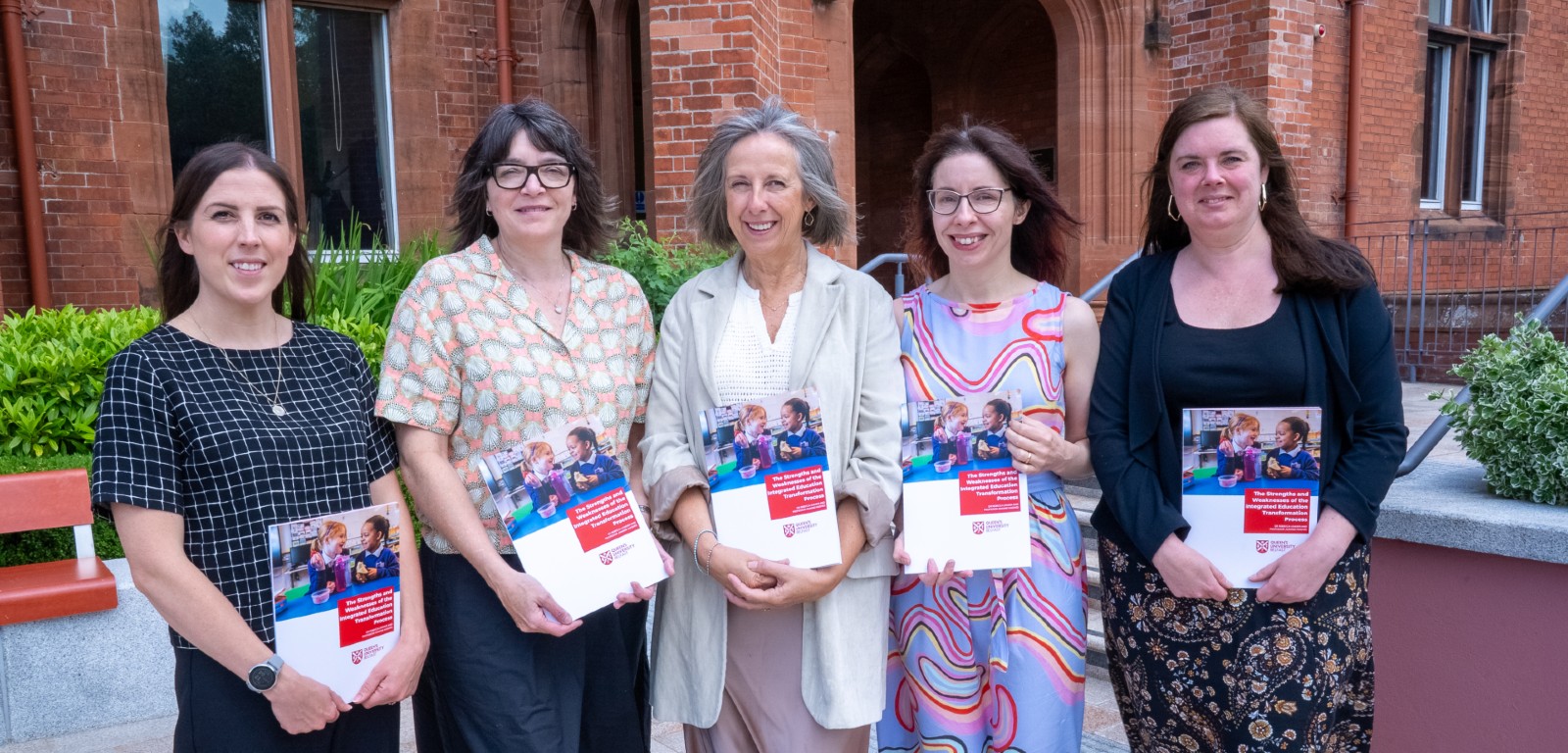‘Significant barriers’ to NI schools becoming integrated according to Queen’s report
Schools in Northern Ireland wishing to transform to integrated status are experiencing significant barriers, despite recent legislation introduced to enhance provision of integrated education, new research from Queen’s has found.

Increasing numbers of schools in Northern Ireland are expressing interest in transforming to an integrated model, particularly since the Integrated Education Act 2022, which requires the Department of Education (DE) and the Education Authority (EA) to actively support integrated education.
But a new report from Queen’s, The Strengths and Weaknesses of the Integrated Education Transformation Process, identifies a number of road-blocks. These include a lack of financial support for schools undergoing transformation; an unduly long time period before a decision on transformation is given by the DE; overly onerous application processes; and a lack of clarity around qualifying pupil numbers.
The report makes a number of recommendations, including:
- Greater financial aid to cover the cost of schools transforming as well as better funding of statutory support partners such as NI Council for Integrated Education (NICIE) and the EA
- DE Ministerial decision to be made within a specified timeframe, in common with other stages and requirements of the transformation process
- Greater clarity around the requirement for schools to demonstrate ‘reasonable numbers’ of pupils from different traditions (this number isn’t currently specified)
- A sectoral body review of how ‘integration’ and ‘diversity’ are understood and communicated
- Administrative burden of transformation to be reduced by greater synthesis of a school’s Transformation Plan and Development Plan
- Greater clarity on minimum pupil numbers (regardless of religion) for schools at risk of being turned down because of unsustainable enrolment (this number isn’t currently specified)
According to the latest figures, around 70 out of 1,000 primary and post-primary schools across Northern Ireland are now integrated. Of these, over 30 have transformed from controlled or Catholic-maintained schools (the majority from controlled).
The impetus for transformation usually comes from parents or a board of governors. If enough parents are then demonstrated to be in support, a parental ballot will be held. If the ballot is successful, a Development Plan is developed by the school and submitted to the DE as a formal application.
Recent decisions
Earlier this year, Northern Ireland’s largest school, Bangor Academy, was turned down for transformation, reportedly because of concern the school would not be able to attract enough Catholics. This was despite more than 40% of its intake being a mix of Catholic, other faiths and no religion; and a parental ballot of almost 80% said to be in favour of transformation.
Rathmore Primary School, also in Bangor, was similarly turned down in recent months, despite over 80% of parents and guardians reportedly in favour of transformation.
Report co-author Professor Joanne Hughes from the School of Social Sciences, Education and Social Work (SSESW) at Queen’s said:
“Schools do not undertake the decision to transform lightly, and the current process is lengthy, onerous and rigorous, requiring support for application from a whole school community.
“In a transitioning society, with increasing diversity and against the Minister’s recent decision to block two schools from transforming, our research suggests that it may be time to consider how integrated education is defined and communicated to reflect the core values of inclusion and diversity.”
Co-author Dr Rebecca Loader, also from SSESW at Queen’s added:
“There have been changes in the profile of schools electing to transform in recent years, with increasing numbers of sustainable schools, Catholic maintained schools and nursery schools passing ballots for transformation. Our research highlights the need for a process that is responsive to the school’s context, size and scale of change, and can provide timely decisions.
“Moreover, if schools are to be supported to transform, in line with current legislation, then available funding must be adequate.”
Despite the challenges of transformation, however, all of the schools in the report sample regarded it as ultimately worthwhile, citing benefits including improved educational experience for pupils, better community relations and a stronger school brand. All schools consulted also felt well supported by statutory and third-sector agencies, particularly the EA, NICIE and the Integrated Education Fund (IEF), which provide guidance and training on transformation.
One area where the report found some divergence was in the interpretation of the term ‘integrated’. While some transforming schools adopted a ‘reconciliation’ model, based on ideas of peacebuilding between the two main religious and cultural traditions in Northern Ireland, others focussed on inclusion across a broader range of indicators including socio-economic background and academic ability.
Further recommendations
The report recommends stakeholders consider an updated definition of ‘integrated’ in the context of a society that has seen many changes and become significantly more culturally diverse since the first integrated school, Lagan College Belfast, was established in 1981.
It also suggests training in multi-cultural education to minimise “well-intentioned but tokenistic approaches that can … reinforce boundaries between pupils of different backgrounds”.
The report was commissioned by the IEF and NICIE and includes a review of existing literature plus interviews with staff from transformed and transforming schools, including head teachers, teachers and governors; parents; and representatives from stakeholder groups. Interviews were carried out between Nov 2023-March 2024, while the literature review and school census data spans 2010-2022.
Media
Inquiries to Una Bradley u.bradley@qub.ac.uk